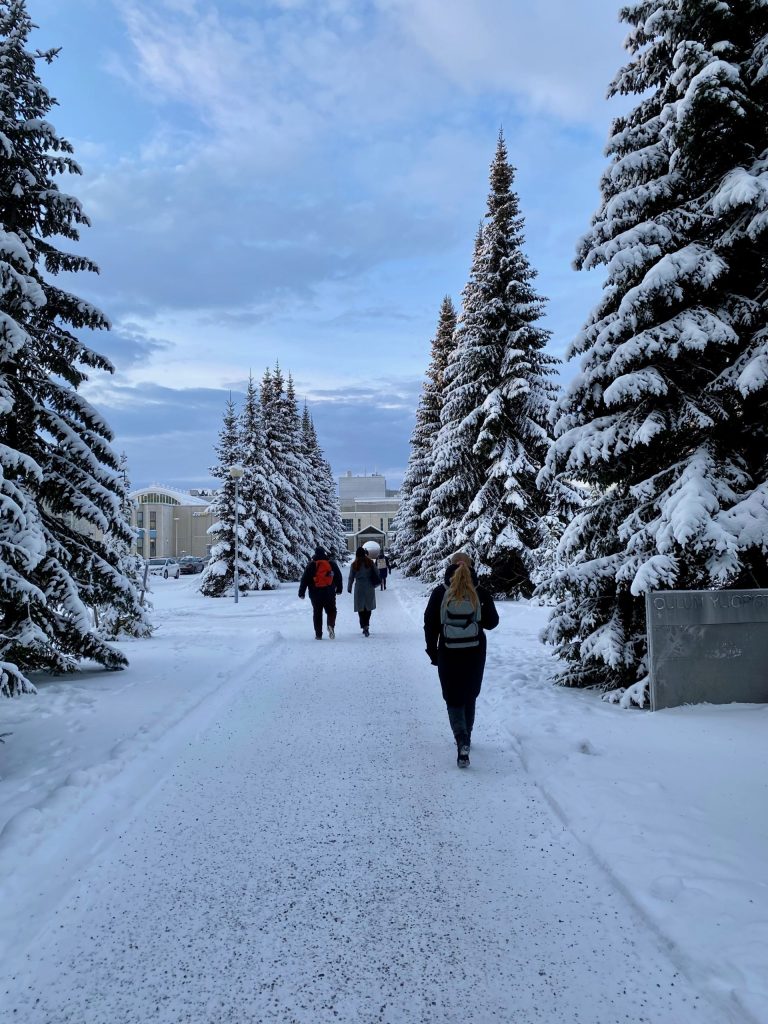Notre collaborateur Marc-André Girard effectue une expédition pédagogique en Finlande et la documente ici!
(co-écrit avec Marie-Andrée Croteau)
La profession enseignante est l’une des plus valorisées socialement en Finlande. Ce n’est pas pour rien: d’une part, tous les enseignants finlandais détiennent, depuis le début des années 80, une maîtrise en éducation. Plusieurs poursuivent au doctorat. Il n’est donc pas rare de compter des docteurs en éducation dans les classes, à pied d’oeuvre avec les élèves de tous les âges. En plus d’être des praticiens, peu importe s’ils sont titulaires d’un diplôme de deuxième ou de troisième cycle universitaire, ils sont tous des chercheurs en éducation. De plus, l’accès à la formation des maîtres est très contingenté. En effet, environ 10% des candidats qui formulent une demande dans l’une des dix facultés d’éducations sont acceptés. Ne devient pas enseignant qui le souhaite!
De facto, les enseignants jouissent d’un statut social et d’une crédibilité enviables. La formation des maîtres dure 5 ans à travers lesquels divers cours de pédagogie, de psychologie et de didactique s’entremêlent de quatre stages répartis sur la durée des études. Ces derniers se déroulent dans les écoles dites “normales” (“normaalikoulu” (primaire) ou “normaalukio” (secondaire)), en occurence des écoles qui appartiennent aux universités, gérées par les facultés d’éducation. Ces dernières, par leur existence, visent quatre principaux objectifs :
- Éduquer les élèves inscrits à l’école au respect des programmes ministériels et locaux;
- Former les étudiants en enseignement, communément appelés les stagiaires en enseignement;
- Mener des activités de recherche fondamentale ou de recherche-action directement dans les écoles, auprès des enseignants, des élèves et même des parents et autres membres du personnel. Il est question de voir au développement pédagogique et, de façon plus globale, au développement en éducation;
- Développer des activités de formation continue pour les enseignants déjà en poste, partout en Finlande. Les écoles normales rayonnent partout dans le paysage scolaire finlandais et elles sont considérées comme des modèles à suivre.
Par ailleurs, il n’est pas rare qu’un enseignant associé, qu’on appelle ici un mentor, ait la charge de 4 ou 5 stagiaires simultanément. On peut donc croiser 200 stagiaires en même temps dans les grandes écoles normales comme celles de Joensuu, qui est la plus grande école normale en Finlande avec ses quatre écoles normales qui comptent plus de 1400 élèves et 190 enseignants et membres du personnel de soutien. Au total, environ 850 stagiaires passent annuellement par le réseau d’écoles normales de l’Université de la Finlande orientale, située à Joensuu.
Nous avons rencontré l’une de ces mentors, Maja, qui, dans le cours de ses études doctorales, a mené une étude à propos du niveau d’engagement des stagiaires en éducation dans leurs études universitaires. Elle en a tiré quelques conclusions préliminaires, dont la suivante qui est particulièrement intéressante : sans surprise, le niveau d’engagement dans la poursuite de leurs études dépend du soutien offert par les mentors en ce qui a trait au développement professionnel sur deux plans. D’une part, le soutien à la tâche enseignante qui inclut la planification, l’évaluation, le pilotage d’activités pédagogiques est incontournable. Toutefois, la trouvaille préliminaire de l’enseignante-chercheuse met en exergue l’importance du soutien aux initiatives et à l’affirmation de l’identité professionnelle de ces futurs enseignants. Autrement écrit, si ces derniers sont appelés à devenir des professionnels de l’éducation autonomes, aussi bien s’exercer dès les stages!
Comme au Québec, les stages prévoient un niveau de prise en charge qui évolue, partant du simple stage d’observation jusqu’à la prise en charge totale de la classe pendant quelques semaines. Voici un aperçu :
Stage 1 : développer les connaissances des élèves et des environnements d’apprentissage grâce à un stage d’orientation dans la profession;
Stage 2 : Apprendre, de façon élémentaire, à enseigner des contenus disciplinaires liés aux disciplines à enseigner;
Stage 3 : Apprendre, de façon approfondie, à enseigner des contenus disciplinaires liés aux disciplines à enseigner;
Stage 4 : Prendre en charge de façon complète un groupe en liant théorie et pratique.
Pour de plus amples informations sur les écoles normales de Joensuu et la formation initiale des enseignants, cliquez ici.
Une fois les cours et la collecte de données terminés, les futurs enseignants doivent rédiger leur mémoire de maîtrise avant d’obtenir leur brevet d’enseignement.
À noter que les stagiaires en enseignement ne sont pas rémunérés.
Enfin, il est intéressant de savoir qu’il existe aussi un phénomène de décrochage chez les enseignants finlandais. Malheureusement, 23% des jeunes enseignants, de moins de 5 ans d’expérience, pensent à quitter la profession vu la charge de travail et la complexité de la tâche.
Pour suivre l’expédition :
Page Facebook : http://t.ly/kkgE
Twitter : https://twitter.com/magirard
YouTube : https://www.youtube.com/channel/UCxHRXb4TqoPP_lyO0GNEh7g
TikTok : https://vm.tiktok.com/ZM8pPbFAk/
Il vous est aussi possible de contribuer au financement de l’Expédition (jusqu’au 22 décembre) : https://gofund.me/4cafa552
(NDLR : L’École branchée est heureuse d’être partenaire média de cette expédition! Notez que nous ne sommes toutefois pas associés à la campagne de financement.)






